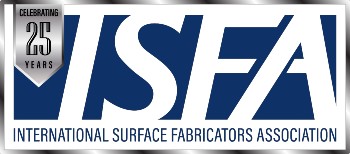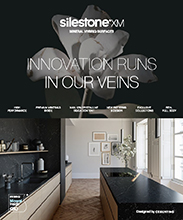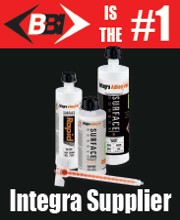- Home
- About ISFA
- Membership
- Events
- Resources & Training
- Countertops & Architectural Surfaces
- Sponsors
- Contact Us
Recycled MaterialsAn Overview of ‘Green’ Countertop Options
Many companies have implemented environmentally friendly methods and recycled materials into their traditional products such as solid surface, laminate, tile, quartz and concrete. There are also many new products in countertop surfaces that meet the demands of green certification and LEED qualification.Who’s Practicing Environmentally Friendly Methods? Formica, for instance, has introduced water-based solvents and recycling of waste. Other laminate companies are beginning to follow suit. In quartz surfacing, Dupont has its Zodiaq Terra collection made with 50 percent pre-consumer recycled content and Silestone has color choices reportedly ranging from 35 to 70 percent post-consumer recycled content. Other quartz surfacing materials, such as MSI’s “Q” product are also said to contain high amounts of recycled materials. Solid Surface fabricators are also going green. LG offers the Eden line of solid surface to compliment its HI-MACS product, Avonite Surfaces has a recycled collection that uses pre-consumer recycled content, and also has a custom sheet size program that helps reduce waste. DuPont’s Corian Terra offers several color choices with 6 to 13 percent pre-consumer recycled content. For concrete slab countertops, Vetrazzo offers slabs are made of 85 percent post-consumer recycled glass in a proprietary formula of cement and pigments. Urbanslabs boasts the same 85 percent in their handcrafted designs and Icestone also has recycled glass concrete countertops. Another popular manufacturer is EnviroGLAS, which touts 75 percent post-consumer glass and 25 percent cement binder by volume. Custom concrete countertop manufacturers can also include recycled materials into their countertops, even recycling materials from the consumer who is buying the countertop! Emerging Materials Among the more environmentally friendly materials are recycled paper slabs. These are typically made with post-consumer office paper and cardboard that is soaked in natural phenolic resins, such as cashew nut shell liquid, and pressed together in a heated pressure chamber. The final product is a pretty durable, abrasive resistant surface in a standard size of 60 by 144 inches. Some distributors also offer 30 by 144 inch, 30 by 72 inch and 60 by 72 inch sizes as well. The major manufacturers of recycled paper countertop materials are Paperstone, Shetkastone and Richlite Other types of surfaces have also come in to fill the niche. These include recycled aluminum countertops created by Alkemi and Eleek. Alkami countertops are reportedly 60 percent post-industrial recycled aluminum bonded with resins. Both Eleek and Alkami surfaces can be custom made to include frontwrap, sidewrap and backsplashes and can be finished in matte or gloss. Bamboo fibers are a strong and versatile natural resource that has recently begun to be used in a variety of applications, including textiles and hard surfaces. Totally Bamboo offers 100 percent bamboo countertops in 25.5, 30 and 36 inch widths and lengths of up to 8 feet. The 1.5 inch thick sheets are said to be 16 percent harder than maple and bamboo is much more sustainable, being more quickly regrown and replaced. These materials are bonded with cross-band laminates and food-grade, formaldehyde-free adhesive. Eco-top offers a product made of 50 percent bamboo fiber and 50 percent wood fiber recycled from building demolitions that are bound in water-based resins. The End Result Each of these options varies in the amount and type of recycled materials. But keep in mind that some companies practice what is known as “greenwashing,” which is making claims that sound environmentally friendly, but in practice don’t stand up. Also, different materials may offer different values in terms of green certification and LEED points. Consequently, consumers are advised to research the options carefully before making a decision. |



